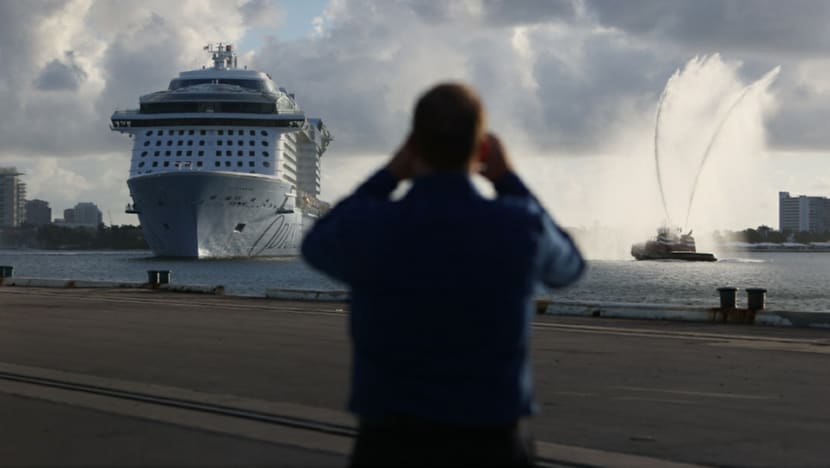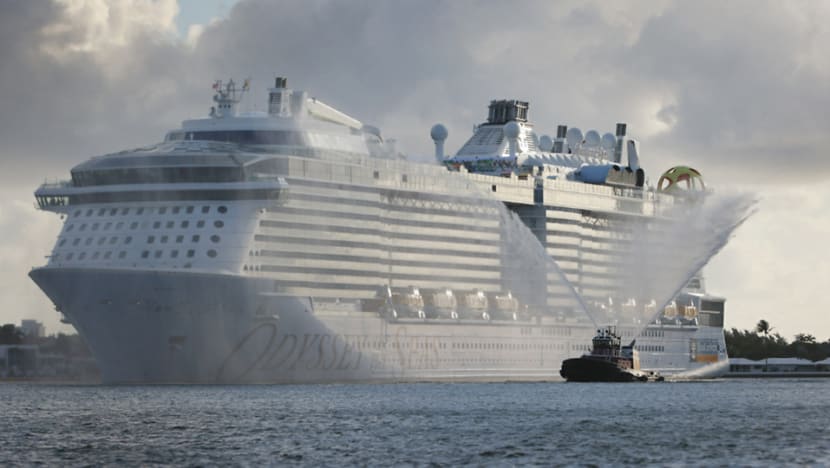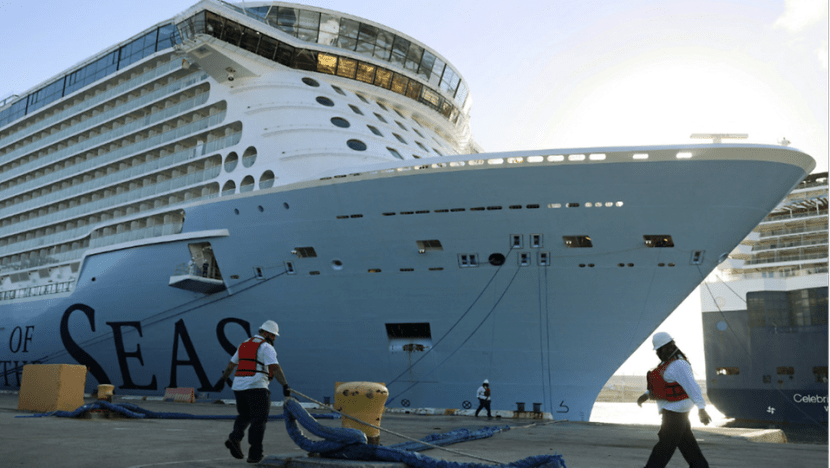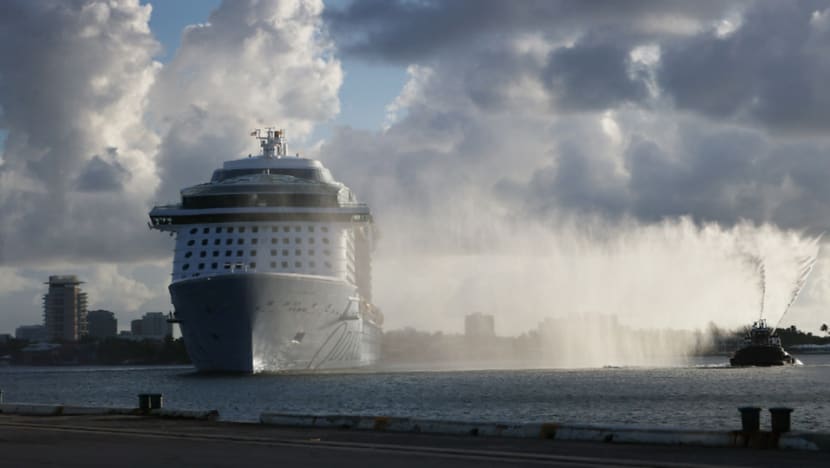US-based cruise lines, eager to go, clash with Florida on vaccines

The Royal Caribbean's Odyssey of The Seas arrives at Port Everglades on Jun 10, 2021 in Fort Lauderdale, Florida. (File photo: AFP/GETTY IMAGES NORTH AMERICA/JOE RAEDLE)
MIAMI: US-based cruise lines are chafing to resume voyages from Florida ports in July as the pandemic wanes - but for vaccinated passengers only - yet the state and its governor won't let them demand proof of inoculation.
So far, neither side has blinked, even as two guests on one of the first cruise ships to sail from North America since the COVID-19 pandemic tested positive on Thursday (Jun 10).
Florida "is the cruise capital of the world," with billions of dollars of revenue and thousands of jobs at stake, said Doug Parker, editor of the Cruise Radio website.
"It would be a big blow if they couldn't come to terms."
If neither side gives in, Parker said, cruise ships "would have to start sailing out of other ports that would accept them ... because these ships are trying to do the right thing."

The US Center for Disease Control and Prevention currently requires that more than 95 per cent of passengers and crew be vaccinated in order for cruise lines to bypass a requirement for trial voyages.
The two guests who tested positive on Thursday were sailing on the Celebrity Millennium, which had departed from the Caribbean island of St. Maarten on Saturday with everyone on board fully vaccinated.
READ: 2 COVID-19 cases on one of the first North American cruises since virus hit
READ: Commentary: Cruises face choppy voyage back to profitability
The pair, who were sharing a stateroom and are asymptomatic, were placed in isolation, Royal Caribbean said in a statement.
The chief obstacle now for cruises departing from Florida comes from Republican Governor Ron DeSantis, who made his tourism-dependent state one of the first to drop its pandemic restrictions.
Last month he signed into law a Bill barring businesses from demanding vaccination "passports," stopping them from requiring that employees provide proof of vaccination - and threatening fines for noncompliance that could amount, for cruise lines, to US$5,000 per passenger.
The measure takes effect Jul 1, just when cruise lines hope to resume operations after a year in which COVID-19 played havoc with their industry.
"While the governor, on the one hand, wants to see jobs back and tourism back ... (he) is kind of his worst enemy, because he's also saying, you can't ask for that same proof," Parker said.
The governor's terse response: "Our state policy is our state policy."
To DeSantis's critics, his is a political decision aimed at winning the votes of Donald Trump sympathisers - many of them vaccine skeptics - ahead of a possible re-election campaign in 2022.
A CONFUSED PICTURE
With the world's three biggest cruise lines all based in Miami, the coming months offer a calendar of confusing and shifting health requirements, with conflict a near-certainty.
Carnival Cruise Line will require vaccination on cruises leaving from Texas - another Republican-led state that has been quick to drop COVID-19 curbs - but Carnival has provided no detailed information on a cruise set to leave Miami on Jul 4.

This Monday, Norwegian Cruise Line - which has threatened to abandon Florida ports altogether - directly defied the governor by saying it would demand proof of vaccination on all its cruises.
"We are currently in communication with his (DeSantis's) staff and legal counsel to ensure that we can offer the safest cruise experience for our passengers departing from the cruise capital of the world," the company's CEO, Frank Del Rio, said.
The third big cruise line, the Royal Caribbean Group, meantime reversed itself.
Having initially announced that it would demand proof of vaccination, it said Friday that passengers and crew were only "strongly recommended" to get the vaccine, and that anyone unvaccinated would face "other protocols."
Celebrity Cruises (part of Royal Caribbean) will launch the first trip from Florida, sailing out of Fort Lauderdale on Jun 26. A "test" cruise six days earlier will depart from Miami.
READ: Commentary: Cruise workers would rather be onboard ships in a pandemic than home
READ: Commentary: COVID-19 outbreak has become an existential crisis for the cruise industry
"It's confusing," Jim Walker, a maritime lawyer, told AFP. His Cruise Law News blog last year provided daily updates on the distress of those on cruise ships stranded at sea by the pandemic.
Now, he said, there's "different companies trying to solve a problem differently."
INFECTIONS IN THE CARIBBEAN
"The impression that the public have is that the cruise line is not taking appropriate steps to send out a message that their ships are safe," said Walker, pointing to a survey by CruiseCritic.com that found that 80 per cent of potential passengers would prefer to travel on ships that demand vaccination proof.
He also pointed out that ships making Caribbean port stops could spread COVID-19 to islands lacking the vaccine access enjoyed by the US - "although quite frankly," he added, "very few cruise lines seem to express concern about that potential."

And cruise lovers, Walker continued, "don't really seem to care if they infect people in the Bahamas or throughout the Caribbean."
"It's so reckless and dangerous and irresponsible," he said.
The cruise industry is hugely important to the Florida economy, generating yearly revenues of US$9 billion and providing jobs for 160,000 people, according to the Cruise Lines International Association (CLIA).
Since ocean voyages were suspended in March last year as the pandemic cut a devastating path around the world, Florida has lost an estimated US$5.6 billion.
Both sides in the current standoff, Parker said, "have a lot to lose."
BOOKMARK THIS: Our comprehensive coverage of the COVID-19 pandemic and its developments
Download our app or subscribe to our Telegram channel for the latest updates on the coronavirus outbreak: https://cna.asia/telegram










